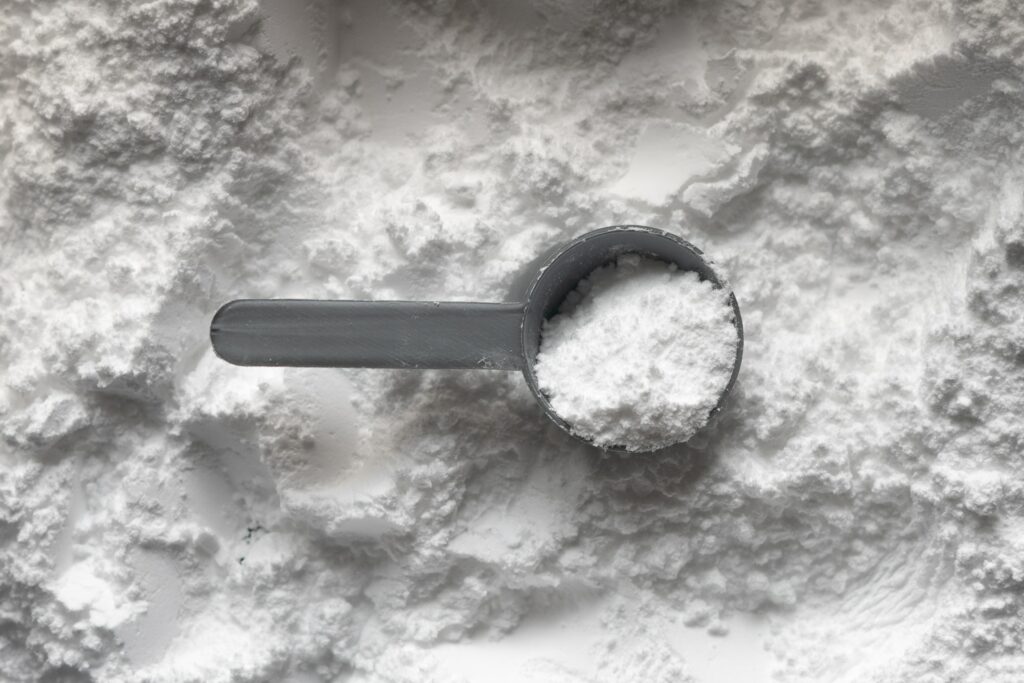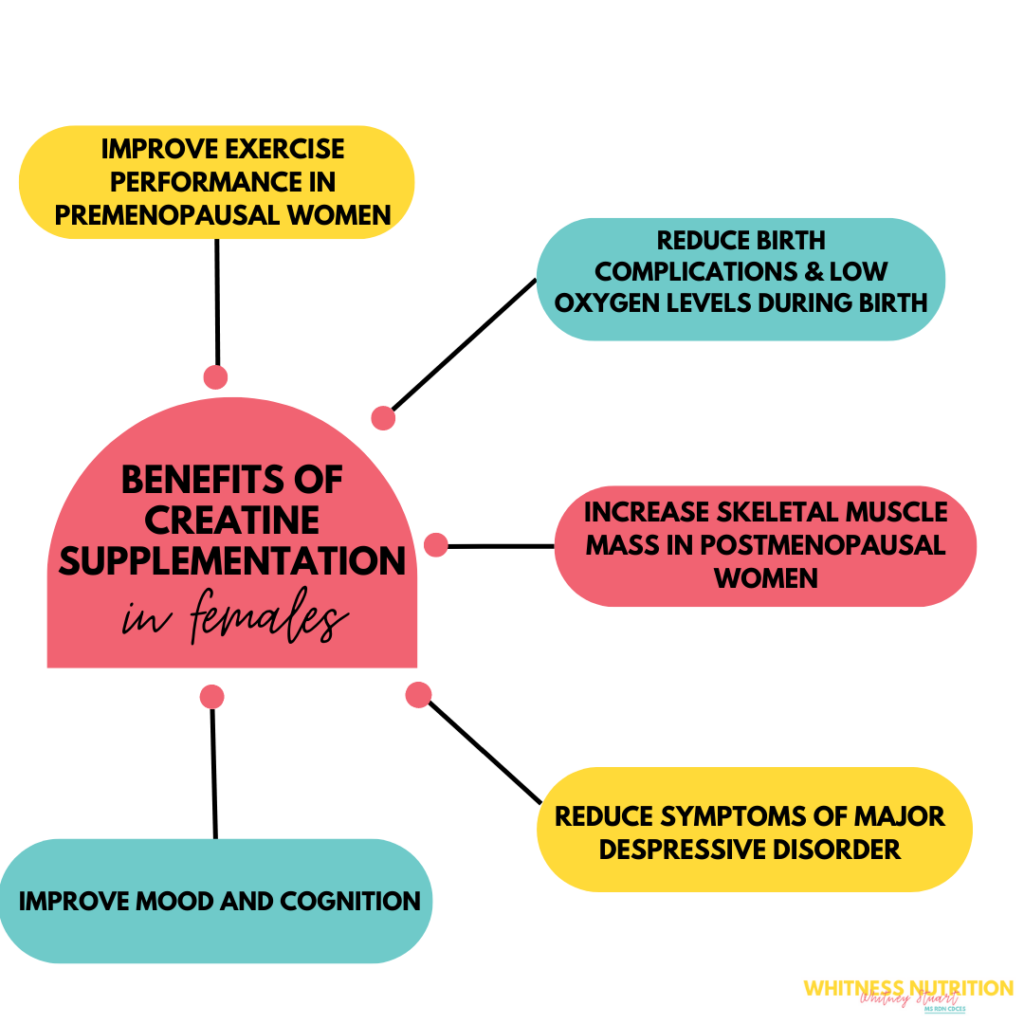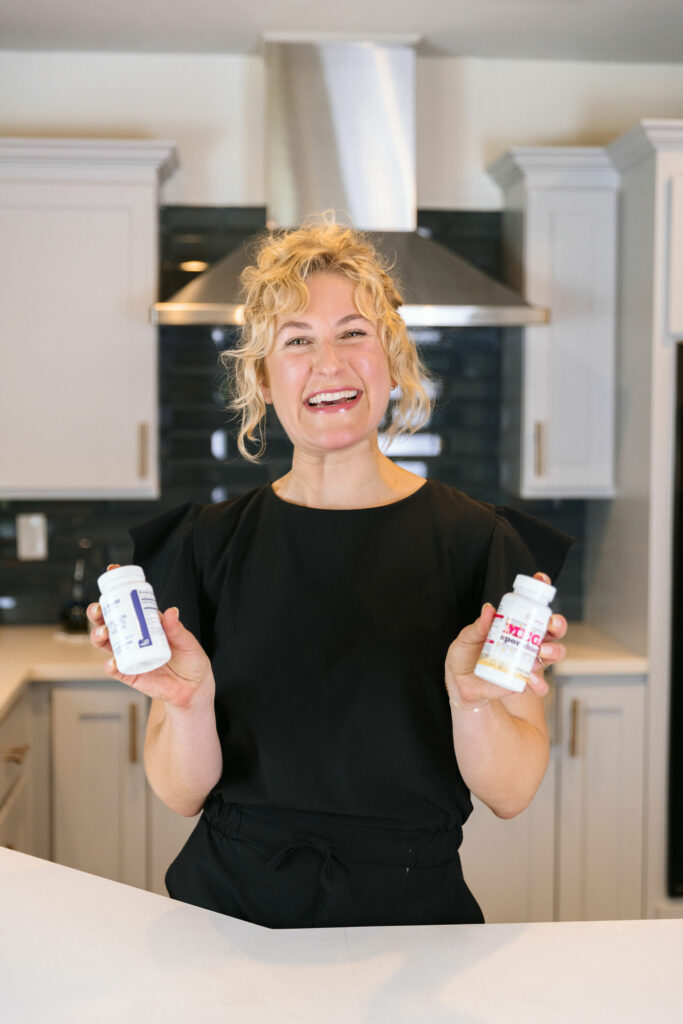Let’s talk C words, creatine, and collagen. You’ve probably seen the liquid collagen supplement that is being pushed by some of the influencers you follow. You know, the aesthetic spoon, with a decadent-looking liquid being squeezed onto it. Perhaps you looked into it and saw the astronomical cost. You may have even said to yourself: But, I need that. Her hair and nails look so great, I want mine to look like that!` 
Want to know what that influencer didn’t tell you about the liquid collagen supplement? It’s mainly comprised of fruit juice extract (goodbye, #bloodsugarbliss). So, what if I told you that there is a cheaper, more effective, and scientifically studied supplement (without an attached MLM program) that can give you all the benefits of liquid collagen and then some.
You’d want the details right away, and girl, I’ve got them!
Side note: Rarely are there studies done on only women. Studies around supplementation in women across their lifespan are especially lacking. But, I found a golden nugget of studies that looked at both of these: creatine supplementation in women across their lifespan, and the many benefits of it. The way supplements work in men and women can differ greatly, so the fact that this study exists is a rarity! And I’m so happy I found it so I could share with you.
A study was done in women across their lifespan and the benefits that were seen with creatine supplementation. Read the legit research, for yourself, here. So, what benefits does creatine offer to females?
Just summarize it for me, Whitney, I’m a busy girl.

“As you can see, creatine supplementation has benefits to the whole body! Let’s break it down into different categories – Mind, Body and Mood – so you can really see what the OG white powder could do for you!”
MIND
It can be taxing to be an adult – the to-do lists are ever-growing! Creatine has been shown to help support our adult brains while under stress. “Creatine supplementation in humans has consistently demonstrated improved cognitive performance and brain function and reduces mental fatigue during stressful mental tasks in healthy adults” (3). This would be more effective (and offer more benefits) than drinking your 10th cup of coffee of the day.
SLEEP
Women often function under sleep deprivation – whether it’s keeping up with our families, the to-do list, or hustling to meet those career goals! This multitasking lifestyle with inadequate sleep is a common occurrence. But, creatine has been shown to help with that. “Creatine supplementation has been shown to support these exact scenarios by augmenting mental capacity under sleep deprivation”(3). Creatine isn’t a band-aid or quick fix for not getting enough sleep, because you know I always prescribe at least 8 hours, especially for women. Instead, creatine can support those times when you’re running low on sleep and need a little cognition support.
BODY
I am so excited about the the benefits that creatine offers for women to build and maintain muscle mass, and as well as bone integrity. The research on this supplement and how it relates to lean muscle mass is ridiculously attractive. “Creatine supplementation among pre-menopausal females appears to be effective for improving strength and exercise performance. Post-menopausal females may also experience benefits in skeletal muscle size and function when consuming high doses of creatine” (3). Young women, and women in mid to late adulthood both saw benefits to their musculature when supplementing with creatine. Strong is sexy, y’all.
Grab your creatine here from our FullScript Dispensary
What’s even more encouraging is that creatine was shown to offset the natural changes that happen with menopause. “Creatine supplementation has been shown to act as a possible countermeasure to the menopausal related decrease in muscle, bone, and strength”(3). Keeping up our strength in both muscle and bone, is so important, especially as we age. Strong muscles and bones will help keep us independent, active and healthy well into late adulthood.
MOOD
Because of the major hormonal shifts that occur throughout a woman’s life – puberty, pregnancy, and menopause – creatine supplementation can help to offset and support mood stability. This study showed that, when taken for 8 weeks alongside regular antidepressant use, women reported a reduction in depressive symptoms (3).
Women also naturally have lower creatine levels in their brain than men. Creatine helps to support memory, mood, cognition and emotions. “As a result of sex-differences in brain creatine concentrations, supplementation may be even more effective for females for supporting a pro-energetic environment in the brain” (3). Another study even found that creatine supplementation can help protect against the development of depression. “…the risk of screening positive for depression was 31% lower among adults in the highest, compared to the lowest, quartile for creatine consumption” (4). In other words, the more creatine that was consumed, the less chance there was of being diagnosed with depression.
I can’t help but love the benefits of creatine more than anything the latest MLM liquid collagen supplements offer. This is an unusual low risk, high reward supplement; indicated as being, “a safe, low risk dietary supplement when consumed in recommended doses and regimens” (3).
Grab your creatine here from our FullScript Dispensary
Let us clear something up!
When you read the word creatine, it’s can easily be misread as creatinine – a biomarker used to assess kidney function. But, that leads to the question, does creatine supplementation have any effect on renal function or creatinine level?
A literature review was done in 2019, it found “creatine supplementation did not lead to renal function damage”(1).This same study also found that the use of creatine did not induce renal disease.
Another study I found supports this same conclusion – which is encouraging! “Creatine supplementation minimally impacts creatinine concentrations and renal function in young healthy adults” (2).
Where do I get creatine?
Through me, via FullScript! Click here to get your better-than-Modere supplement, with so many more added benefits! It has the Whitness Nutrition stamp of approval, so you know it’s well-sourced and extensively vetted.
How do I take creatine?
Easy! No major shift in routine is necessary. Simply mix with water or any beverage of your choice. You can even add it to your overnight oats or mix into your yogurt bowl.
How much do I take?
Start with a large, loading dose, for a week – 20–25 grams of creatine per day. Then, you will decrease and maintain supplementation with 3–5 grams daily. Take it after exercise to increase blood flow and lean muscle mass. Keep an eye out for nausea, diarrhea and muscle cramps!
Creatine can even be supplemented during pregnancy, but of course, talk to your provider! The side effects are little to none – some loose stools and gassy symptoms during initial onset of use.
Grab your creatine here from our FullScript Dispensary
Science-based supplementation is what I’m all about. Do you want more customized supplement recommendations? Book a call with me to get started!
Resources Cited:
- de Souza e Silva, A., Pertille, A., Reis Barbosa, C. G., Aparecida de Oliveira Silva, J., de Jesus, D. V., Ribeiro, A. G., Baganha, R. J., & de Oliveira, J. J. (2019). Effects of creatine supplementation on renal function: A systematic review and meta-analysis. Journal of Renal Nutrition, 29(6), 480–489. https://doi.org/10.1053/j.jrn.2019.05.004
- Pline, K. A., & Smith, C. L. (2005). The effect of creatine intake on renal function. Annals of Pharmacotherapy, 39(6), 1093–1096. https://doi.org/10.1345/aph.1e628
- Smith-Ryan, A. E., Cabre, H. E., Eckerson, J. M., & Candow, D. G. (2021). Creatine supplementation in women’s Health: A Lifespan Perspective. Nutrients, 13(3), 877. https://doi.org/10.3390/nu13030877
- Bakian, A. V., Huber, R. S., Scholl, L., Renshaw, P. F., & Kondo, D. (2020). Dietary creatine intake and depression risk among U.S. adults. Translational Psychiatry, 10(1). https://doi.org/10.1038/s41398-020-0741-x


